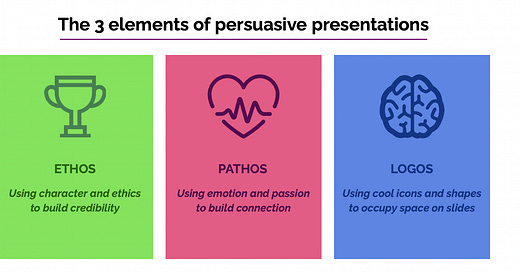The Greek self-improvement influencer Aristotle laid the foundation for the science behind persuasion. He explained that persuasion is composed of three key elements — ethos, pathos and logos (character, emotion and logic). Thousands of years later, management consultants, the modern Aristotles of the world, transformed PowerPoint into a tool of persuasion. They accepted Aristotle’s theory but added their own twist to it, in order to make it more MECE. They retained the first two elements and gave a new meaning to the word ‘logos’, realising that logic wasn’t needed in their field of work.
With this new approach to persuasion, today, countless analysts spend millions of hours rearranging slides. If you suffer a similar fate, I have a few practical and effective tips for you to make your presentations stand out.
Ethos
What’s in a name?
In the early stages of your career, when you haven’t really built a name for yourself, except as that guy who occupies meeting rooms for no apparent reason, it is important for you to build credibility through proxy. An easy way to do this is to use obscure names as references while delivering your presentation. Sure, no one might have heard of Amir Akhil, but it’s a miracle that his extensive research on your topic confirms your findings. Using someone else’s name comes in handy if something were to go wrong and you want to quickly shift blame.
That’s what she said
The previous tip works best when you’re presenting to a set of people who have some level of expertise in a particular field. But when you’re trying to establish your credibility with a set of self-proclaimed generalists, it’s best to avoid obscure names. Take more familiar names that will attract their attention and attach a made-up quote to these names. Elon Musk, a favourite of the generalists, might not have said that the ed-tech sector in India needs much tighter regulations or that Bengaluru is the best startup hub in the world. But it’s very believable if you were to put such a quote beside his photo. If anyone asks for the source, you are one Twitter Blue subscription away from generating the fake quote.
Pathos
The Super Singer effect
Growing up in a generation that watched Super Singer (or Indian Idol) on a weekly basis, we’ve witnessed plenty of upsets in the finals, which boiled down to which contestant had the saddest backstory. Sadness, manifested as guilt tripping the audience, is an underrated tool of persuasion. Imagine you’re pitching your startup to funders and the opening slide has the picture of a man smiling ear-to-ear. Congrats, you’ve raised zero US dollars. Venture capital runs on schadenfreude and a picture of a crying baby is all they look for in a pitch deck. It does not matter that your product is a B2B SaaS solution.
Imagine
A few sentences ago, I made up a scenario that is obviously not a true representation of the real world. That is the power of the word ‘imagine’. John Lennon, Steve Jobs and Gal Gadot have all shown us the weight of this word in changing people’s minds. That’s because anything is possible in an imaginary world. So, feel free to exploit this hack by asking your audience to just imagine your main points into existence. The best form of persuasion is when your listeners persuade themselves.
Logos
I con with my icons
Good presentations aren’t overloaded with information. At the same time, having too much white space on your slide might convey that you haven’t done any work and that your weekly wages were spent on a team dinner at the Taj. To bridge this paradoxical gap, icons play a crucial role. When used correctly, not only do icons take up space, they also transform the audience’s experience from an auditory monologue to a visual journey, which is critical if you are presenting to a bunch of five-year olds.
Shape of உ
For the final tip, let’s take a look at how talking in shapes can come to your advantage. You might have come across articles from thought leaders, where they sprinkle terms such as U-shaped job markets, T-shaped professional development and K-shaped recovery. You might have wondered what the hell they were talking about. One-up them in their own game by using other letters of the alphabet. In fact, don’t stop there. Move away from the Latin alphabet. Vernacular languages especially have that element of panache which is sure to take your audience by surprise. Imagine your audience’s reaction to your concept of ழ்-shaped ecosystem transformation. Not only will they accept that you’re smarter than them, but they will also not be able to pronounce it, which means that your idea is now inimitable.




This is one step away from being a Fake News :3
Preetham!! This is hilarious! Very stealth shiva-esque for corporate feels!